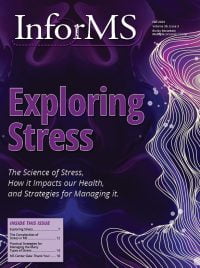
In this issue we’ve learned about the science behind stress, as well as the many different types of stress that can manifest in our lives. Managing these various forms of stress is crucial for those living with MS, as we know that stress can and does exacerbate many common MS symptoms.
It’s important to acknowledge systemic stress is a major contributor to the stress we all feel as individuals. Systems that don’t always provide an adequate safety net for individuals with chronic diseases and their caregivers and families, the health care systems we all navigate, and the very nature of the world we live in all cause stress in varying degrees.
Complicating matters further, people of color, under-served and under-insured communities, and marginalized people all experience chronic stress at increased rates. Many of these groups also lack access to resources that can help them deal with stress adequately.
With that in mind, we’ve complied some strategies tailored to various types of stress MS patients may encounter, many of which are self-driven and hopefully accessible to most people.
While we’ve separated these strategies to align with the types of stress discussed in this issue, it’s important to understand that there is lots of overlap. These strategies are not meant to be focused singularly on specific types of stress; instead, you may find many or all of the strategies here are perfectly reasonable and effective ways to address whatever type of stress you find yourself dealing with at any given time. Of course not all strategies will work for all people, and some may align with your interests and abilities better than others. If something listed here is new to you, try to approach it with an open mind and see if it’s something that can become one of your personal stress-fighting tools.
Acute Stress Management
Managing acute stress involves techniques that deal with the immediate emotional and physical reactions to a stressful situation or event.
It’s important to remember that acute stress isn’t always bad – at the core, it’s a natural response to challenging situations or dangers, and over the course of human history, it’s served us well as a species to alert us to and protect us from a wide range of environmental dangers. In today’s world, it still serves many of the same purposes, but it can also crop up when it’s neither wanted nor warranted. Strategies to reduce and manage acute stress are based on regaining control over your emotions, and alleviating the immediate physical impact of this type of stress.
Mindfulness and Relaxation Techniques: Deep breathing, meditation, and progressive muscle relaxation — like those in guided “body scan” techniques — can help calm the body’s immediate stress response. The mindfulness movement has given rise to countless free resources to help you get started. YouTube is full of guided meditations of all sorts, and apps like Insight Timer and Calm offer free and paid content that’s always at your fingertips.
Time Management: Prioritizing tasks and setting realistic goals can mitigate the stress associated with short-term pressures. Try an online time management system, the built-in calendar features on your mobile phone, or even a good old-fashioned notebook or calendar to keep track of tasks and commitments, and ensure you’re not spreading yourself too thin.
Physical Activity: Engaging in brief physical activity, like a brisk walk or another aerobic activity that gets your heart pumping, can release endorphins and reduce stress. A regular exercise routine is helpful as well, but the immediate impact of simply getting up, moving your body, and increasing your heartrate and bloodflow can have significant stress reduction benefits.
Acceptance: It’s more challenging than it seems sometimes, but acknowledging and understanding that some things are simply out of your control can go a long way toward reducing their effect on your acute emotional and physical response. Close your eyes, take a few breaths, and accept that you just can’t control everything around you all the time.
4-7-8 Breathing: A Quick and Effective Stress Reducer
Based in techniques from pranayama yoga and made popular by Dr. Andrew Weil, 4-7-8 Breathing is a relaxing breathing technique that can be used in almost any situatiuon to help reduce the immediate impact of stress. Here is a simple guide to the technique:
- Exhale completely through your mouth.
- Close your mouth and inhale quietly through your nose while counting to four in your head.
- Hold this breath as you count to seven.
- Exhale completely through your mouth as you count to eight.
- Repeat this cycle three more times, for a total of four 4-7-8 breath cycles.
Chronic Stress Management
Chronic stress persists over an extended period of time, and requires a sustained approach to maintain physical and mental health. Managing it is an ongoing process that takes self-awareness and dedication, and often professional guidance. Rather than dealing with immediate causes and effects, chronic stress management involves making lifestyle adjustments that can lead to better overall stress management and ultimately to an improved quality of life. Here’s a concise overview of strategies to manage chronic stress:
Stress Reduction Techniques: Regular practice of stress-reduction techniques like yoga, tai chi, qi gong, or meditation can help manage ongoing stress. Look for local community centers offering classes, or again head to YouTube or your favorite search engine to look for guided offerings that you can use at home. Many options readily available online feature adaptable exercises like seated yoga that allow you to tailor the experience to your mobility and comfort level.
Counseling and Therapy: Seeking support from a therapist can provide emotional outlets for chronic stressors, and you can work with a therapist to develop coping strategies that fit your situation and lifestyle.
Healthy Lifestyle: There’s no shortage of benefits to an overall healthy lifestyle, but one that’s not often talked about is its impact on your emotional wellbeing. Simple things like maintaining a balanced diet, regular exercise, and sufficient sleep can improve your resilience to chronic stress.
Social Support: Building a strong support network of friends and family can not only make you generally happier, but also gives you a network of people who can offer emotional assistance in times of prolonged stress.
Eustress Management
Eustress is often referred to as “positive stress,” which can give the impression that it’s all good all the time, and managing it isn’t important. Unfortunately, it’s not quite that simple. Eustress arises from exciting or challenging experiences, like starting a new job, planning a wedding, or riding a roller coaster – on the surface, this can seem and feel harmless, but a constant or prolonged state of this “positive” stress can develop into many of the same negative physiological and emotional impacts of other types of stress.
The key to managing eustress effectively involves harnessing its positive energy for personal growth and well-being. Here are techniques to effectively manage eustress:
Embrace Challenge: Maintain a positive mindset, view challenges as opportunities for growth, and leverage eustress for motivation and achievement.
Goal Setting: Setting clear and achievable goals can help channel eustress into productive endeavors. When developing a goal, there are a few parameters that can be helpful to increase your likelihood of succeeding. It can be easy to make a goal that’s too big or vague. Try making the goal a “S.M.A.R.T.” goal where you’ve thought about these five key elements: is my goal Specific, Measurable, Attainable, Relevant, and Time-based?
Self-Care: Prioritize self-care activities to maintain well-being and prevent eustress from turning into distress.
Celebrate Accomplishments: Recognize and celebrate your achievements along the way. This can reinforce a positive mindset and develop a sense of satisfaction from completing or finishing tasks related to your eustress-generating situation.
SMART Goal-Setting: Channel Stress Into Productive Pursuits
Goal-setting can help harness some of the “positive” elements of Eustress into accomplishiments and achievements that can counteract some of the negative effects. But to do so, you need a plan. Try the “SMART” framework, by making your goals:
- Specific: Can you define your goal quickly and succinctly?
- Measurable: Is your goal something with an outcome that you can see or quantify?
- Attainable: Is it realistic and within your ability?
- Relevant: Is the goal meaningful and helpful?
- Time-based: Is it able to be done in a specifc timeframe, rather than an open-ended challenge?
Distress Management
Distress is most often described as a state of severe mental or emotional suffering, usually arising from situations or events that overwhelm your ability to effectively cope with what’s going on. When common self-management and stress reduction practices aren’t working, that may be a sign that you’re dealing with true distress.
Distress may require professional help, or at the very least, a thoughtful and dedicated commitment to the coping strategies and techniques you already have in place. It’s essential to tailor the approach to your individual needs and to the severity of the situation that’s causing distress, and seek timely assistance when distress becomes overwhelming.
Professional Help: Seek assistance from mental health professionals to address and manage distress effectively. Distress is not something you have to tackle alone, and when your stress reduction strategies are overwhelmed, it may be time to reach out for help.
Addressing Underlying Causes: Self-reflection and introspection during times of distress can help you identify and deal with underlying causes of distress, as well as helping to identify triggers that may worsen what you’re dealing with. Often, our emotions and distress may be communicating something important to us that needs to be understood. Understanding the root issues can allow you to find solutions, set necessary boundaries to minimize stressors, and develop healthier coping mechanisms.
Coping Skills: Develop and utilize healthy coping mechanisms to navigate overwhelming situations. This can be any of the coping mechanisms mentioned here, but may take more dedicated attention and commitment to help you through the severity of a distressful situation.
Self-compassion: Be kind and forgiving to yourself during times of distress, recognizing that everyone faces challenging moments. Dr. Kristin Neff, an Associate Professor of Educational Psychology at the University of Texas at Austin, explains self-compassion in this way: “When you feel compassion for another… it means that you realize that suffering, failure, and imperfection is part of the shared human experience. Self-compassion involves acting the same way towards yourself when you are having a difficult time, fail, or notice something you don’t like about yourself. Instead of just ignoring your pain with a ‘stiff upper lip’ mentality, you stop to tell yourself ‘this is really difficult right now,’ how can I comfort and care for myself in this moment?”
PTSD and Trauma Management
Dealing with PTSD and past trauma requires a comprehensive, holistic approach, beginning most often with professional help. Guidance from a therapist can help provide education about PTSD and its triggers, and a deep look at its root causes in your life. Understanding trauma can be difficult, but ultimately it empowers individuals to better manage their condition.
Therapy: Trauma-focused therapies like Cognitive-Behavioral Therapy (CBT) and Eye Movement Desensitization and Reprocessing (EMDR) with mental health professionals can be effective.
Medication: In some cases, medication may be prescribed by a healthcare provider to manage a wide range of symptoms related to trauma and its lasting effects, including anxiety, stress and depression.
Personal Safety and Reducing Triggers: Those suffering from PTSD and trauma commonly are faced with triggering situations and events that can cause extreme stress reactions. Protecting yourself from such situations involves identifying and avoiding triggers, and building an environment where you feel protected and safe from harm related to past traumatic events.
Support Groups: Sharing experiences and receiving support from others who have faced trauma can be an important therapeutic tool. Many groups are available both in-person and online, breaking down geographic and scheduling barriers for many participants. Seek out local groups or ask a mental health professional for suggestions about what groups may be a fit for you.
Burnout Prevention and Management
Preventing burnout focuses on maintaining physical and emotional health in the midst of all of life’s demands. This can be a particular concern for people living with MS, when often real-world life and work responsibilities continue, regardless of what MS might be challenging you with on a daily basis. Fatigue, sleep problems, and a host of other common MS symptoms can conspire to make burnout a serious concern.
Work-Life Balance: Prioritize time away from work and engage in hobbies and activities that bring joy. Non-paid work like caregiving and parenting can also cause burnout and it’s important to take restorative breaks from this work when possible to find healthy balance. things you love to do — even as little as 15 or 20 minutes a day — can reduce feelings of burnout.
Set Boundaries: Establish clear boundaries to prevent overexertion and especially for excessive work-related stress.
Self-Assessment: Regularly assess physical and emotional well-being to identify signs of burnout early on, and develop strategies to ensure you’re finding balance between things you “have” to do and things you “want” to do.
By combining these tailored strategies, individuals can begin effectively managing and reducing the negative impact of stress on their physical and mental health. The benefits of stress management are numerous, including improved health, reduced anxiety, increased focus, better relationships, and an overall enhanced quality of life.
InforMS would like to thank Dr. Courtney Legge for her review and contributions to this issue. Dr. Legge is a Licensed Psychologist who works with the clinical staff and patients at the Rocky Mountain MS Center at University of Colorado.







